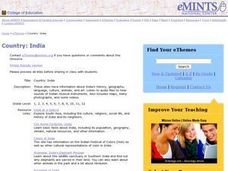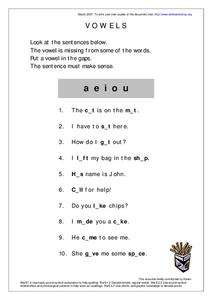Curated OER
Read and Draw- Silent E
For this long vowel O worksheet, students illustrate six words. Students draw a picture to go with words containing long vowel O with a silent E.
Curated OER
Families of Instruments
Students identify families of instruments. In this music lesson, students read Berlioz the Bear and identify the families of instruments. Students sing "Mr. Gus Goes Goofy," and listen for the sounds of the instruments.
Curated OER
The Art of Improvisation
Students explore the work of 3 for All. In this performing arts lesson, students watch a video segment about the improvisation group 3 for All, study improvisation, and participate in their own improvisation routines.
Curated OER
Musical Mountain
Students listen to low, middle, and high pitches of music and identify if they are low, middle, or high. In this musical pitch lesson plan, students visually see low, middle, and high pitches on a mountain.
Curated OER
Technology that Makes Phonics Fun
Learners discover the Internet by participating in on-line educational activities. In this educational technology lesson, students utilize interactive story books, podcasts, and games to help expand an understanding of phonics....
Curated OER
Inspirational Pop Art
Students examine visual art by examining Internet sources. In this art identification lesson, students discuss the history of art after researching information on the Internet. Students view artwork by Keith Haring and create their own...
Curated OER
Country: India
Students use the Internet to study the history, geography, culture and art of India. Videos, photographs and maps are included.
Curated OER
Adaptive Worksheet: Simple Questions
In this adaptive simple questions learning exercise, students answer 4 questions about a set of 4 pictures of everyday items. A reference website for additional resources is given.
Curated OER
Which Letter Comes First?
For this literacy worksheet, students find the pictures that correlate to the words and they also decide which letter to begin the spelling of each word.
Curated OER
Growing Seeds
In this science worksheet, students read 5 different scenarios with varied growing conditions for plants. Students make a prediction for each: Will it grow a little, grow a lot, or not grow at all?
Curated OER
Back To School Crossword
In this reading worksheet, students analyze 10 words which pertain to Back to school time. Students read clues and fit the words in the crossword puzzle.
Curated OER
Vowels
In this grammar worksheet, students read ten sentences where the vowel is missing in some of the words. They put the correct vowel in the space to make each sentence make sense. Students also identify whether each word is a short or long...
Pennsylvania Department of Education
Writing With Environmental Print
Students develop literacy skills by exploring street signs, cereal boxes, and billboards. In this writing with environmental print lesson, students build word recognition in every day print. Students decode words and discover new words.
Curated OER
Initial Consonant Clusters
In this literacy worksheet, students look for the words that correlate to the pictures that are listed. They are all words that are consonant clusters.
Curated OER
Picture Match
Young scholars match pictures with words that have specific phonics connotations. For this picture matching lesson plan, students have groups of words with the same phonics sayings.
Curated OER
Alphabet Activities
In this literacy instructional activity, students complete a variety of activities involving the alphabet. They also practice putting words into alphabetical order.
Curated OER
Initial Consonant Clusters -1
For this literacy worksheet, students find the words to complete the crossword puzzle. They are focusing on the concept of consonant clusters.
Curated OER
"th" numbers
Second graders practice the code in English for fraction is that the words end in "th." They write and solve problems involving halves, quarters, thirds and fifths as they realize that the meaning of fraction words one "x-th" is that it...
Curated OER
Informational Report on a Desert Animal
Second graders create a report, using the internet and other resources to create a Power Point Presentation on a desert animal.
Curated OER
Four Fours Challenge
Second graders look at the number patterns created when tins are stacked in different arrangements. The aim of the unit is for students to keep track of the numbers involved by drawing up a table of values. They are then encouraged to...
Curated OER
Homophones
In this language arts activity, students read 12 sentences and choose the appropriate homophone for each. There are 2 choices for every blank.
Curated OER
Read Martin's Big Words
Learners read Martin's Big Words. For this social studies lesson, students read and discuss the life and times of Dr. Martin Luther King Jr.
Curated OER
Introduction to Melodic Notation: Sol-Mi
Second graders sing melodic sol-mi songs for teacher and student assessment. Emphasis is placed on drill and practice while developing melodic singing skills. Students evaluate performances and activities using pre-determined rubric...
Curated OER
Homonym, Homophone, Homograph
In this language arts instructional activity, learners learn the difference between homophones, homographs, and heteronyms by reading this informative chart. Detailed examples are given for all. There are no questions on the page.

























